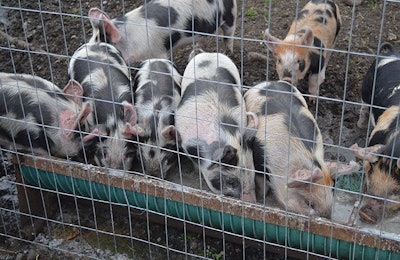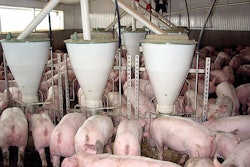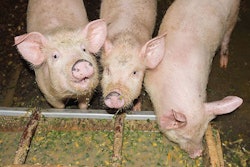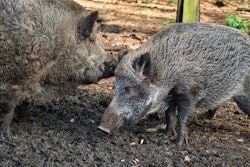
Chinese authorities have recorded the return of African swine fever (ASF) to Hubei province. As a result of the devastating losses to Asian pork production brought about by a year under the threat of outbreaks, some countries and entrepreneurs are taking the opportunity to make changes to their farming structure or businesses.
Vietnam, for example, is taking steps to reorganize its livestock sector in the wake of devastating losses from ASF, while Malaysia is focusing on stepping up measures to reduce the risk of the virus entering its borders.
ASF returns to China’s Hubei province
The ASF virus has been detected in a small backyard herd of 32 pigs after several of the animals died near the city of Honghu in the south of Hubei province, according to the ministry of agriculture. Local authorities initiated emergency procedures, including the culling and destruction of the remaining pigs, a ban on pig movements, and thorough cleaning and disinfection.
This latest outbreak comes about three weeks after cases were detected at a small farm in Huangang city prefecture in the east of Hubei.
Continuing ASF outbreaks in China highlight the need for the maintenance of high-level controls in order to beat the disease and restore China’s domestic pork supply. This was one of the key points raised by agriculture minister Han Changfu during a recent video conference on the ASF situation in the country, according to the agriculture ministry.
Although ASF in unlikely to lead to a significant shortage of meat in China beyond this year, a recent report from the USDA Foreign Agricultural Service (FAS) suggests that the current high price of domestic pork may already be tempting some of China’s pig farmers to restock prematurely, or to expand their businesses.
China’s continuing difficulties in battling ASF nationwide have caused some farmers to consider other enterprises.
About one-quarter of the Chinese pig population has been lost already to ASF, according to official data, and up to half the country’s breeding sows, reports South China Morning Post. However, the duck meat market is booming.
So attractive are the prospects that the Shenghe Group is expanding production by 30% in Shandong province. The firm says the collapse of domestic pig production has pushed up duck meat prices by a factor of three from one year ago, but it is still cheaper than pork.
Vietnam restructures livestock farming
There have been no official reports of new ASF outbreaks in Vietnam over the past week.
The disease has already killed 3 million pigs or 10% of the swine population in Vietnam, according to Vietnam News, and the authorities are looking ahead to the recovery of the sector after the disease has been eradicated.
For the eventual restructuring of the country’s animal agriculture sector, the head of the livestock department of the agriculture ministry has called for households, farmers, cooperatives and companies to develop close cooperation.
According to Nguyen Xuan Duong, this would lead to the establishment of chains that would allow for better regulation of production, processing and marketing of animal products, and thus improved food safety and the development of exports.
He also called for a shift away from the production of pigs to that of cattle, sheep and goats, as well as a move away from the animal-dense areas of the southeast and Red River Delta and to the less pressured central and Central Highlands regions. For some areas, there is untapped potential in poultry and seafood production.
Malaysia steps up disease precautions
Concerned by the spread of ASF across national borders in Asia, animal health authorities in Malaysia recently held a forum for farmers, private companies and government officials, reports The Star.
At the meeting, pig farmers were urged to improve biosecurity, and in case of suspicious disease symptoms, to stop all pig movements, and inform the authorities. Movements or sales of ASF-infected pigs or carcasses increase the risk of spreading the infection further.
If ASF were to enter Malaysia, the disease could wipe out the nation’s 600 pig farms, and devastate the MYR5 billion (US$1.2 million) industry, warned a senior official at the agriculture ministry.
View our continuing coverage of the African swine fever outbreak.

















